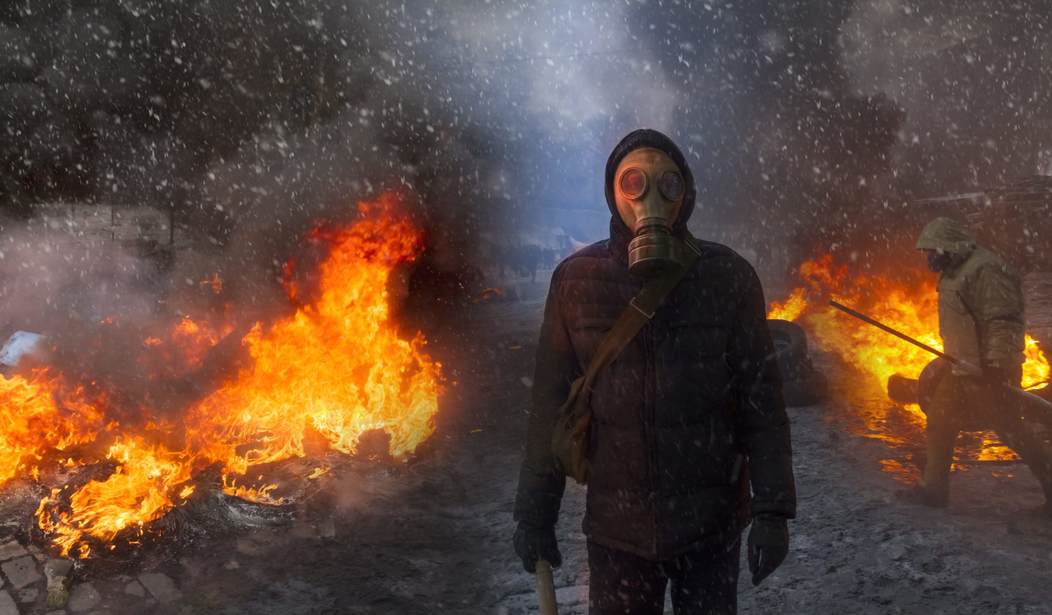Emmanuel Macron has been elected president of France, “delivering a resounding victory to the unabashedly pro-European former investment banker and strengthening France’s place as a central pillar of the European Union”. Of equal significance is the forthcoming Korean presidential election whose frontrunner, Moon Jae-in, could take a more conciliatory approach to North Korea’s Kim Jong-un.
Moon [could be] at odds with U.S. President Donald Trump, who says that military force remains an option to halt Kim’s pursuit of nuclear weapons and the long-range ballistic missiles that could bring them to North America. Moon this week blasted a U.S. push to install a missile shield in South Korea before the election, saying the decision should be reviewed by the next president.
In other respects, however, they may see eye to eye. Moon has long said he’s prepared to meet Kim under the right conditions, a position Trump espoused this week in an interview with Bloomberg News. He also sees the policy of the past nine years as a failure, wants China to take more action and favors a two-track approach of sanctions and dialogue.
Ironically South Korea’s sea change is driven by many of the same economic worries which roiled France. The rising Korean generation fear they won’t have the same opportunities as their elders. “According to a Gallup poll in late April, 53 percent of respondents age 19 to 29 supported Moon Jae-in, the left-leaning front-runner, while just 17 percent of those older than 60 supported him. Only 11 percent of those between 19 and 29 said they supported presidential candidates from conservative parties — compared with 20 percent of those above age 60.” It’s a concern common not only to Korea, but throughout the developed world.
At the heart of the divide are two very different experiences of life.
When the Korean war ended in 1953, “people were literally worried about starving,” said Kim Nak-nyeon, a professor who teaches economic history at Dongguk University. The war-struck cities didn’t have the infrastructure to support all the people pouring in from the countryside looking for a better life, and many had to live in shanty towns while taking care of family members, he said. …
But the years of rapid economic growth are well over, and difficulty finding good jobs has created a different set of barriers for today’s young Koreans.
Many of the nation’s youth now refer to themselves as the “sam-po generation,” or the generation that’s given up on relationships, marriage and having children, because their economic prospects have become so limited.
Although Macron’s victory and Moon’s likely triumph will likely be portrayed as a return of electoral politics to the globalist mainstream — a reversal of the Brexit/Trump trend — they are actually the opposite. Both are attempts to solve challenges that have baffled the elite. Hillary Clinton in her latest attempt to reinvent herself revealed an off-beat turn. “I’ve spent decades learning about what it would take to move our country forward, including people who clearly didn’t vote for me. To try to make sure that we dealt with a lot of these hard issues that are right around the corner, like robotics and artificial intelligence, and things that are really going to be upending the economy, for the vast majority of Americans, to say nothing of the rest of the world. So, I’m now back to being an activist citizen, and part of the resistance.” [Italics mine]
Macron is going down the same old, same old. Globalization, social media, scientific revolutions are still taking the world order apart. At least Hillary’s at the point where she’s changing the talking points to see what happens. The hurricane which began with Brexit and Trump, far from dying down, is amping up as the local elections in Britain suggest. The working class has been orphaned by the Left and Macron claims to be the Center. The winds are coming from another quarter.
It’s possible the ‘responsible’ plan is to rely on a Macron or Hillary to guide us into a future they alone understand, but not likely. Perhaps what is happening is partly explained by Venezuela, which exhibits an eerie stability even as it sinks into chaos. A New York Times article explains Venezuela’s calm as a case of stress aggregation rather than conflict resolution. The Venezuelan elites have not won and sitting on their laurels; they are just deadlocked waiting for someone to break ranks to show which way to run.
Even as Venezuela sinks into chaos, with clashes between protesters and the police escalating, why have its powerful political and military elites stuck by President Nicolás Maduro?
The country would seem to be a prime candidate for something scholars call an “elite fracture,” in which enough powerful officials break away to force a change in leadership. … Elite fracture operates as a kind of game in which each player tries to figure out what the others are about to do. Stay loyal to a failing government too long and you risk going down with it. But if you break with the government and others don’t, you’ll pay a high price for disloyalty. …
“The fact that it hasn’t happened in the last two years is the biggest puzzle of all,” said Steven Levitsky, a Harvard University political scientist. “If it happens next week, all of us will say, ‘Yeah, it was bound to happen.’” …
Members of the elite, in this game, try to test one another over where they stand, as well as the government’s strength, in order to decide whether to remain loyal. If enough believe they have achieved critical mass to force a leadership change, they will all push at once. … The deciding vote in these situations is often cast by the military, which has the power to break a deadlock among elites and, often, the popular legitimacy to lead a transition.
In this view the Global Elites are marking time, watching for which way to break. Meanwhile they are testing the waters, even as Hillary is doing, essaying a new idea here, a little innovation there. Matthew Continetti observed in the National Review that the 2016 election seemingly never ended and that none of the dramatis personae went away. “I thought she’d disappear,” referring to Hillary and boy was he wrong.
Nothing goes away any more. Perhaps these toxins are building up because the Information age has made memes unkillable. Causes, from Vichy to the Resistance have achieved virtual immortality. Communism will never die and Hillary runs in 3020. At least in the pre-Internet age things went out of scope and even Hiter died and was forgotten. Today there is no garbage collection in the public space. Objects persist forever or at least until the operating system runs out of memory. Even ISIS is expected to live on after it’s battlefield death to go underground like Camus’ plague bacillus until … well that’s the problem. Nobody is quite sure what “until” means.
Follow Wretchard on Twitter
For a list of books most frequently purchased by readers, visit my homepage.
Support the Belmont Club by purchasing from Amazon through the links below.
Books:
The Revenge of Geography: What the Map Tells Us About Coming Conflicts and the Battle Against Fate, Author Robert D. Kaplan builds on the insights, discoveries, and theories of great geographers and geopolitical thinkers to look back at critical pivots in history and then to look forward at the evolving global scene. The result is an interpretation of the next cycle of conflict throughout Eurasia and a future that can be understood in the context of temperature, land allotment, and other physical certainties. To those who suggest that globalism will trump geography, this book shows how timeless truths and natural facts can help prevent this century’s looming cataclysms.
The Worst Hard Time: The Untold Story of Those Who Survived the Great American Dust Bowl, by Timothy Egan. The book tells the story of the dust storms that terrorized America’s High Plains in the darkest years of the Great Depression and the people that held on: their desperate attempts to carry on through blinding black blizzards, crop failure, and the deaths of loved ones.
The No-Fuss Bread Machine Cookbook: Hands-Off Recipes for Perfect Homemade Bread, by Michelle Anderson. Finally, a bread machine cookbook that shows you how to use your bread machine for its intended purpose ― convenience! This is the first and only collection of truly easy, hassle-free recipes that give you delicious homemade loaves of bread every time, with more than 150 recipes using easy-to-find ingredients and minimal work.
Modern Prometheus: Editing the Human Genome with Crispr-Cas9, by Jim Kozubek. Would you change your genes if you could? As we confront the ‘industrial revolution of the genome’, the recent discoveries of Crispr-Cas9 technologies are offering, for the first time, cheap and effective methods for editing the human genome. Tracing events across a fifty-year period, from the first gene splicing techniques to the present day, Kozubek weaves together the fascinating stories of many of the scientists involved in the development of gene editing technology, demystifies how the technology really works and provides thought-provoking reflections on the ‘commodification’ of life.
For a list of books most frequently purchased by readers, visit my homepage.
Did you know that you can purchase some of these books and pamphlets by Richard Fernandez and share them with your friends? They will receive a link in their email and it will automatically give them access to a Kindle reader on their smartphone, computer or even as a web-readable document.
The War of the Words, Understanding the crisis of the early 21st century in terms of information corruption in the financial, security and political spheres
Rebranding Christianity, or why the truth shall make you free
The Three Conjectures, reflections on terrorism and the nuclear age
Storming the Castle, why government should get small
No Way In at Amazon Kindle. Fiction. A flight into peril, flashbacks to underground action.
Storm Over the South China Sea, how China is restarting history in the Pacific
Tip Jar or Subscribe or Unsubscribe to the Belmont Club










Join the conversation as a VIP Member